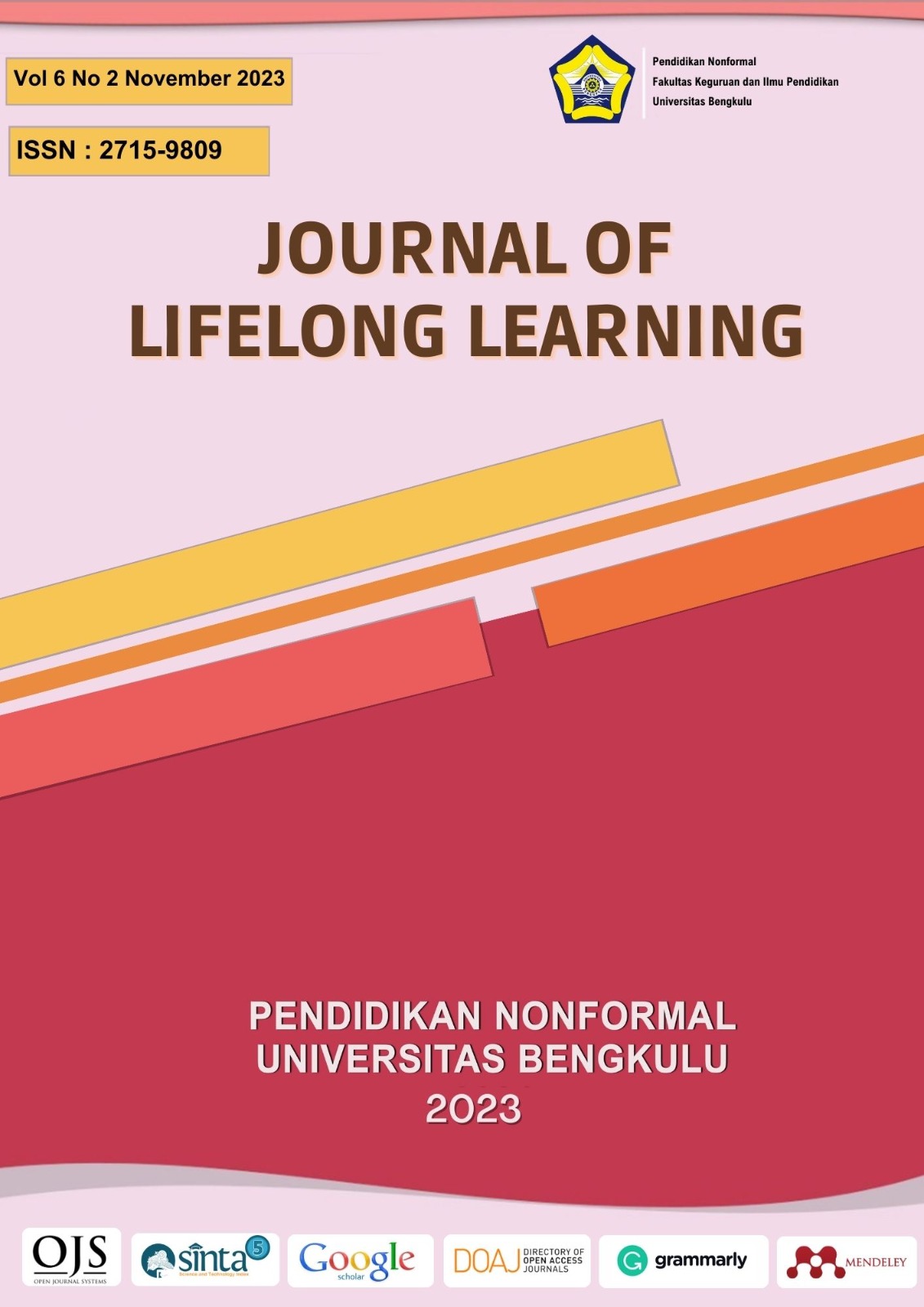Main Article Content
Abstract
Abstract: The research objectives (1) describe the role of PKK cadres in increasing community participation, (2) describe the factors that influence community participation. The research used a descriptive qualitative approach with the research subjects including the chairperson and two members of the PKK posyandu cadres, as well as three community participants. The research data were collected through interviews, observation, and documentation. The results showed that (1) the role of PKK cadres as facilitators, motivators, planners, implementers, and instructors has been running well. (2) Factors influencing community participation include education level, where people with higher education tend to be more critical and active in the implementation of posyandu. Information and communication are also influential, where good communication allows communities to access information about posyandu schedules, services provided, and the benefits they obtain. The activeness of the facilitator can provide motivation and support to the community to actively participate in posyandu.
Keyword : Role, Family Welfare Empowerment, Community Participation
Article Details
Copyright (c) 2023 Bunga Rahmadanti, Ratnah Sari Dewi, Ika Rizqy Melia

This work is licensed under a Creative Commons Attribution-ShareAlike 4.0 International License.
Authors who publish with this journal agree with the following terms:
- Authors retain copyright and grant the journal right of first publication with the work simultaneously licensed under a Creative Commons Attribution License that allows others to share the work with an acknowledgement of the work's authorship and initial publication in this journal.
- Authors are able to enter into separate, additional contractual arrangements for the non-exclusive distribution of the journal's published version of the work (e.g., post it to an institutional repository or publish it in a book), with an acknowledgement of its initial publication in this journal.
- Authors are permitted and encouraged to post their work online (e.g., in institutional repositories or on their website) prior to and during the submission process, as it can lead to productive exchanges, as well as earlier and greater citation of published work (See The Effect of Open Access).
- This work is licensed under a Creative Commons Attribution-ShareAlike 4.0 International License.
References
-
Ariyani, N., Yusuf A. (2014). “Peranan Kader Kesehatan dalam Pembinaan Wanita Pekerja Seks (WPS) di Lokalisasi Sunan Kuning.” Journal of Non Formal Education and Community Empowerment. 3(2), 36-43.
Dwi, M. (2020). “Faktor-Faktor yang Berhubungan dengan Tingkat Partisipasi Ibu
Balita dalam Kegiatan Posyandu di Desa Tambang Kecamatan Tambang Kabupaten Kampar Riau.” Jurnal Fakultas Ilmu Sosial dan Ilmu Politik. 7(1), 1-16.
Fitriani, F., Apriadi, A., & Hidayat, O. (2021). “Peran Pemberdayaan Kesejahteraan Keluarga (PKK) dalam Mensosialisasikan Program Kesehatan di Desa Sepukur Kecamatan Lantung.” Journal of Communication Science. 3(1), 94-102.
Kementerian Kesehatan RI. (2012). Ayo ke Posyandu Setiap Bulan. Jakarta: Kemenkes RI.
Mendagri RI. 2013. Peraturan Menteri Dalam Negeri RI Nomor 1 Tahun 2013 tentang Pemberdayaan Masyarakat melalui Gerakan Pemberdayaan dan Kesejahteraan Keluarga.
Nugrahani, Farida. (2014). Metode Penelitian Kualitatif dalam Penelitian Pendidikan Bahasa. Solo: Cakra Books.
Nurbaiti, S. R., & Bambang, A. N. (2017). “Faktor-Faktor yang Mempengaruhi Partisipasi
Masyarakat dalam Pelaksanaan Program Corporate Social Responsibility (CSR).” Proceeding Biology Education Conference. 14 (1), 224-228.
Peraturan Presiden Nomor 99 tahun 2017 tentang Gerakan Pemberdayaan dan Kesejahteraan Keluarga.
Purwandari, A. W., & Mussadun, M. (2015). “Studi Partisipasi Masyarakat Pada Pelaksanaan Musyawarah Perencanaan Pembangunan Kelurahan Di Kelurahan Semanggi Kota Surakarta.” Jurnal Pembangunan Wilayah & Kota. 11(4), 377-390.
Siregar, E. (2021). “Peran Kader Posyandu (Pos Pelayanan Terpadu) Sebagai Upaya Peningkatan Kesejahteraan Ibu dan Anak”. Jurnal At-Taghyir. 3(2), 171-186.
Soekanto, Soerjono. (2015). Sosiologi Suatu Pengantar. Jakarta: Rajawali Pers.
Sugiyono. (2015). Metode Penelitian Kuantitatif, Kualitatif, dan R&D. Bandung: Alfabeta.
Trisliatanto., A.D. (2020). Metodologi Penelitian: Panduan Lengkap Penelitian dengan Mudah. Yogyakarta: Andi.
References
Dwi, M. (2020). “Faktor-Faktor yang Berhubungan dengan Tingkat Partisipasi Ibu
Balita dalam Kegiatan Posyandu di Desa Tambang Kecamatan Tambang Kabupaten Kampar Riau.” Jurnal Fakultas Ilmu Sosial dan Ilmu Politik. 7(1), 1-16.
Fitriani, F., Apriadi, A., & Hidayat, O. (2021). “Peran Pemberdayaan Kesejahteraan Keluarga (PKK) dalam Mensosialisasikan Program Kesehatan di Desa Sepukur Kecamatan Lantung.” Journal of Communication Science. 3(1), 94-102.
Kementerian Kesehatan RI. (2012). Ayo ke Posyandu Setiap Bulan. Jakarta: Kemenkes RI.
Mendagri RI. 2013. Peraturan Menteri Dalam Negeri RI Nomor 1 Tahun 2013 tentang Pemberdayaan Masyarakat melalui Gerakan Pemberdayaan dan Kesejahteraan Keluarga.
Nugrahani, Farida. (2014). Metode Penelitian Kualitatif dalam Penelitian Pendidikan Bahasa. Solo: Cakra Books.
Nurbaiti, S. R., & Bambang, A. N. (2017). “Faktor-Faktor yang Mempengaruhi Partisipasi
Masyarakat dalam Pelaksanaan Program Corporate Social Responsibility (CSR).” Proceeding Biology Education Conference. 14 (1), 224-228.
Peraturan Presiden Nomor 99 tahun 2017 tentang Gerakan Pemberdayaan dan Kesejahteraan Keluarga.
Purwandari, A. W., & Mussadun, M. (2015). “Studi Partisipasi Masyarakat Pada Pelaksanaan Musyawarah Perencanaan Pembangunan Kelurahan Di Kelurahan Semanggi Kota Surakarta.” Jurnal Pembangunan Wilayah & Kota. 11(4), 377-390.
Siregar, E. (2021). “Peran Kader Posyandu (Pos Pelayanan Terpadu) Sebagai Upaya Peningkatan Kesejahteraan Ibu dan Anak”. Jurnal At-Taghyir. 3(2), 171-186.
Soekanto, Soerjono. (2015). Sosiologi Suatu Pengantar. Jakarta: Rajawali Pers.
Sugiyono. (2015). Metode Penelitian Kuantitatif, Kualitatif, dan R&D. Bandung: Alfabeta.
Trisliatanto., A.D. (2020). Metodologi Penelitian: Panduan Lengkap Penelitian dengan Mudah. Yogyakarta: Andi.
